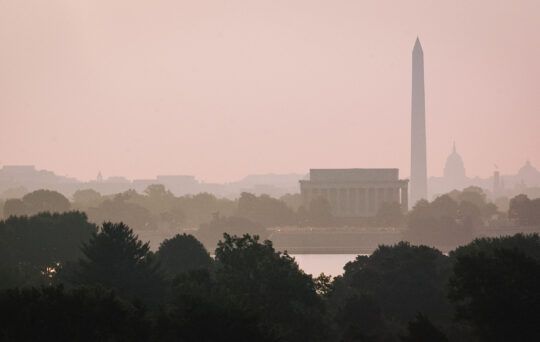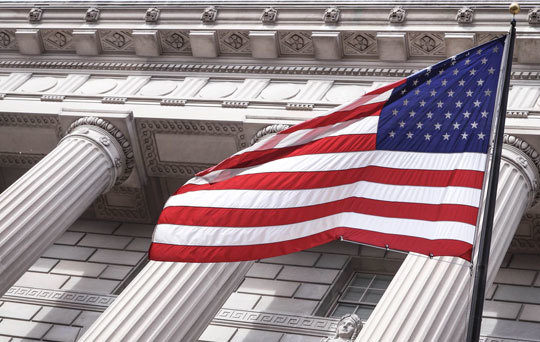By Michelle Boorstein
Mike McCurry was President Bill Clinton’s spokesman during the Whitewater and Monica Lewinsky years, so suffice to say he knows what it’s like to feel uncomfortable at a podium. But his typical audience these days scares him in a new way.
A few weeks ago, McCurry, 59, became a teacher in religion and politics at Wesley Theological Seminary, from where he graduated last spring. It marked his official transition from a hard-charging, super-political spin doctor who quietly attended church to a very public evangelizer for the idea that religious values can save “the frozen tundra” of today’s politics.
“I had no problem getting up and doing briefings before millions of people, but I am fearful in front of 12 students that I can’t really fake it,” says McCurry, who spent more than two decades as a political spokesman before going on to do communications for corporations and non-profits. “I’m laying it on the line about who I am and what I believe in a way that’s different. When you’re spokesman for someone else, they don’t care what you think.. These people want to know who I am.”
Who McCurry is is, in part, a hybrid: He derides the political scene but is still very much in it, as an advisor to left-leaning religious advocacy groups and candidates. He almost spits the word “spin doctor” but has remained in communications and image-making his entire life. He’s known both as the guy who prompted great skepticism by declaring himself “out of the loop” on the Clinton-Lewinsky relationship and as an elder statesman of respectful, frank dialogue. The whole point of his program at Wesley is to get seminarians - most of whom are on the progressive side -- to be comfortable merging to merge their faith and politics in the public square. And yet several of his closest friends say he never speaks to them about his own beliefs.
When he left the Clinton Administration in fall of 1998, McCurry wrote on White House stationary to a friend that he wanted to do “something that counts.” Yet his is not a story of some radical conversion, some Chuck Colson kind of thing on the left. It’s a more subtle tale of a guy who has always had both a faith life and a political life, but realized later that the two should be one.
Growing up in Northern California in the churning late 1960s, McCurry’s family was involved in the local Congregational church, which is part of the liberal United Church of Christ. While his parents focused on church music, McCurry eagerly participated in youth group trips to protest against the war in Berkeley. He loved politics.
“The church is what brought me to politics. But I thought: If the church is doing politics, I can go do politics on my own, which is what I did,” he said.
As high school newspaper editor, he had advocated for more racially integrated schools. When he was a senior, he chose to switch to the all-black high school “to attempt to prove the courage
of my convictions.”
His father and grandfather worked for the government and he saw public service and politics as a noble calling, an expression of his values. At that point — and for a few decades — he didn’t
give a lot of thought to what Christianity taught and what he believed. He also didn’t attend church once he left his parents’ home.
After graduating from Princeton University he went right to Washington to work as a press secretary for Democratic senators and a string of Democratic candidates for the White House (all lost,
including Bruce Babbitt, Bob Kerrey and John Glenn).
McCurry was considered a gifted communicator, and even though he hadn’t been part of Clinton’s initial campaign crew (Kerrey was a competitor), in 1994 he was brought from the State Department to the White House.
At that point religion was largely associated in politics with the right wing, and as secular Americans became a larger part of the Democratic Party base, Democrats became increasingly uncomfortable framing their values in spiritual terms. By then, McCurry and his wife, Debra, were parents and had become regulars at St. Paul’s United Methodist church in Kensington, where he taught Sunday school and made the separation between religion and politics more formal.
“I went to church on Sundays but it never dawned on me - it never occurred to me that that should affect how I should behave,” McCurry says. “... “Church for me was a sanctuary away from the
world of politics, where I could get away from it all, and have my own spiritual reflections. I wasn’t contemplating what scripture said about right and wrong. It was more like: How can I get through this day?” He never spoke about his faith at the White House.
Speaking openly about faith was not the Democrats’ way, but it wasn’t McCurry’s way either. He was - and is - somewhat private about his faith.
“He’s more likely to talk about John Boehner than John Wesley. I think that’s a side of himself he’s happy to share but reluctant to impose,” said Joe Simitian, a childhood friend with whom McCurry remains close and who went on to become mayor of Palo Alto. Other friends chuckled at the image of McCurry-as-choir-boy, talking about prayer or sitting around reading the Bible quietly.
But the scrutiny of the rough-and-tumble Clinton years began to wear on McCurry. He was a huge defender of the president and of their policies, but says he was hurt when editorial writers or others would question his character. Even though McCurry was popular with reporters, it was the nature of the job for him to evade, bully and sometimes even threaten.
In 1996 a New York Times editorial said McCurry’s “stonewall” on a campaign finance issue had left “his reliability in tatters.” McCurry and the emotional rollercoaster of being at the podium featured prominently in former Washington Post media writer Howard Kurtz’s popular 1998 book “Spin Cycle.”
“For the first time in twenty years in public relations, his personal credibility was being questioned, and it hurt,” Kurtz wrote of the time around the editorial.
Meanwhile, his faith remained in a different compartment.
But he began to look at his role in a more critical way when longtime network correspondent Brit Hume “said I was the most political person who had ever been at that podium,” he said. “When Brit said that, it may have been the moment when I said: Am I dialed up too much?”
Ironically, McCurry was popular with the press - and the public - in part because he was seen as relatively transparent.
He remembered reading reporting about himself and thinking: ‘What have I done besides being a spin doctor that has created something important or some common good?”
When he left the White House in late 1998, his pastor said, now “you can do something important,” McCurry recalls. The pastor asked him to take a bigger leadership role at the Sunday School, but
at that point, he recalls (in slightly more profane language), he didn’t know that much about Christianity. To fill that gap, he began taking courses at Wesley, a mainline Protestant seminary in Northwest affiliated with McCurry’s Methodist denomination.
He went into private communications consulting with the firm Public Strategies Washington and did some political advising, including at the tail end of John Kerry's 2004 campaign when the Swift Boat controversy was raging. By then his guidelines were clear.
“I said, I’ll do it, but I don’t want to be a mad-dog and say mean things about [George W.] Bush and the other side, ” McCurry says. “...I think that experience for me said: This Christian thing has a practical application, a lightbulb went off. We can have serious debate in this country, without always questioning the other side’s motives. It’s corrosive.”
The Wesley courses slowly shifted his perspective about the purpose of his church life – and of politics. He was fascinated to see how early Christians dealt with similar issues: power, politics, sex scandals and the tension between pure morality and the pragmatic pursuit of policy change. And he thought about what he really believed for the first time.
“It brought out for me how you articulate what a creator God is for you. I don’t think I ever thought in those terms. I did my church thing, but as far as: What is God, how is God interacting with you, how is God affecting the world — those are profound questions I’d spent no time thinking about. I began a lifelong search for those answers,” he said.
As he slowly worked toward his degree he began doing some bipartisan presentations to groups like chiefs of staff or Senate staffers. He became increasingly convinced that what modern
political life needs is an infusion of basic scriptural values, primarily: treat others with respect. He wanted to help both sides: infuse progressive religious types – such as many of his students – with the skills to be models of effective, and yet loving politics, and get sheer politicos to realize “you don’t need to blast your opponent every time they get a traffic ticket.”
McCurry’s place in Washington public life has changed quite a bit.
Since leaving the White House he has played the role of generous, wise mentor to a generation of progressive Christians. He has advised most of the advocacy organizations that have sprung up in the past decade to give voice to religious liberals who felt conservatives were unfairly claiming the Bible in politics. He began doing some bipartisan presentations to groups like chiefs-of-staff or Senate staffers.
“People are always deferential to him and just want to listen to whatever wisdom he has to share,” said Mara Vanderslice Kelly, who was a faith advisor to Kerry in 2004, a position unheard of at the time for a Democratic presidential candidate, but now slightly more common. “He is incredibly kind and generous. If there is a rough and tumble side to him, it certainly doesn’t come out anymore.”
Another thing that still doesn’t come out a lot is McCurry’s faith.
At a recent Monday afternoon class, he sat around a huge square table in his downtown office with Kelly and the 13 students in Wesley’s National Capitol Semester for Seminarians, which is geared
toward students interested in politics or policy.
Kelly recently left the office at the White House that works with faith-based groups, and was telling students about her path. They were animated not by juicy details of the White House, but about her own coming to Christ.
McCurry sat watching, quiet.
“I am not an openly-professing evangelical Christian who tells people on the street: ‘Let me tell you about my pal Jesus.’ I don’t wear my religion out there,” he said later. “That has not been the vocabulary of my world. It’s a little outside the box for me. But I’m getting more comfortable.”

House Republicans are discussing options for providing aid to Israel and Ukraine, and several new chairs have taken the subcommittee gavels at the House Appropriations Committee.
Read More
This week, House Republicans will select a new chair of the Appropriations Committee and will deliver to the Senate articles of impeachment against Homeland Security Secretary Alejandro Mayorkas.
Read More
The gavel will be changing hands soon at the House Appropriations Committee, the Select Committee on the Chinese Communist Party, and possibly the Rules Committee.
Read More